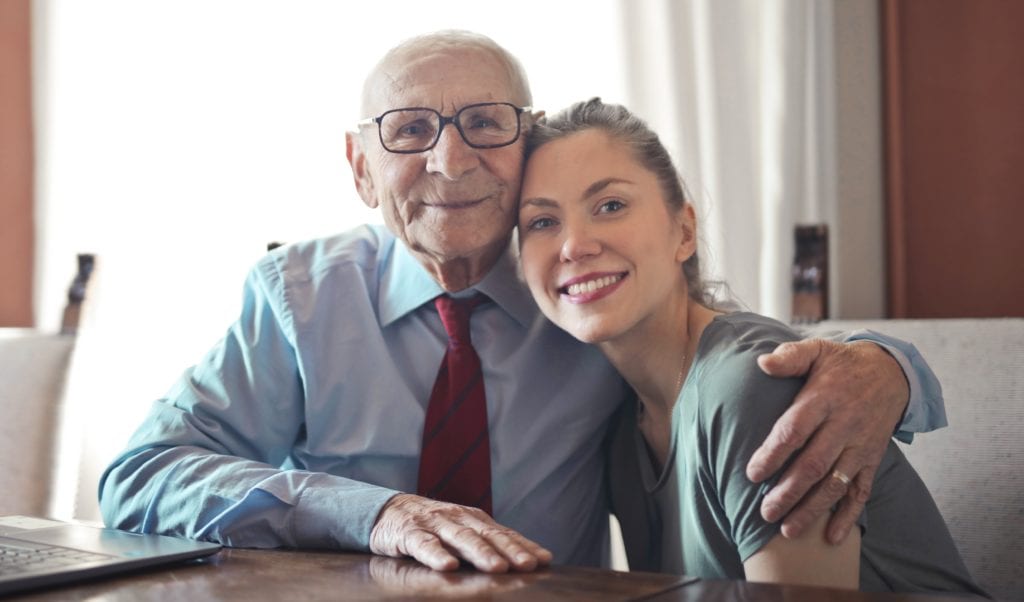This Father’s Day, Don’t Forget Dad’s Dad, Grandpa
By • June 17, 2021 0 1773

One of the happiest returning post-pandemic sights in Georgetown, parks and playgrounds – Rose, Volta, Montrose, the waterfront, et al. – is to see toddlers, school children and even teens romping with their grandfathers. Almost always the “old” guy has the look of utter contentment, even as he pretends not to struggle to keep up on the bike, the scooter, the fast walking (rarely running), the frisbees and the balls – all the balls. Post-pandemic grandpas increasingly can be seen reading to their grandchildren on park benches, eating ice cream with them at Thomas Sweet, pushing the stroller down to the river. And you sure don’t see any grandkids complaining.
In the past, grandparents – grandpas and grandmas, both maternal and paternal – have always been venerated in family literature and lore. They have been seen as the irreplaceable provider of unconditional love and support – if not always total obedience. “Grandparents have a serious responsibility to hug and to snuggle, to play what the child wants to play, to help them flourish,” writes Jane Isay in her 2018 book “Unconditional Love.” “The grandchildren see themselves through our eyes as thoroughly delicious individuals. The family stories they tell give them roots to grow, insight on how their families endured, slipped, fell and picked themselves up again.”
Usually, the emphasis in the press of the joy of grandparents focuses on the grandmother, as in PBS icon Lesley Stahl’s 2016 book “Becoming Grandma.” But much of what she writes goes for grandpas too. “The gift of grandchildren is they keep us young and attached,” writes Isay. “For grandfathers who may be retired or not so engaged in the world, the connection with grandchildren is a life saver. Many studies have found that grandfathers who are engaged in loving ways with their grandchildren live longer and healthier lives.”
But the role of grandparents, especially grandfathers, changed during the pandemic. Suddenly grandparents were put behind windows, doors and walls “for their own protection.” They weren’t allowed to be with their children or their grandchildren because they all were deemed to be “vulnerable.” The relationship for many families became a worrisome burden.
During the pandemic, many grandparents upped their computer skills significantly. They got good at internet shopping and investing, zooming bridge games and coffee chats, even travelling online. Some got so they could play computer games – with thoughts of their grandkids. But no one would say that “being” with grandchildren of any age online, was a replacement for physically being with them. Especially as most children were already oversaturated with screen time in school, so-called play dates, entertainment, distraction busy-work and just babysitting – getting them away from the parents and siblings.
“Geographic distancing is always the greatest barrier to a relationship with grandchildren even before the pandemic,” said Amy Goyer of AARP (the American Association of Retired Persons). “Now since the pandemic, technology had added to the physical distancing and independence of adult children, their parents and their kids even when they live nearby,” the family and grandparent relations expert added during a Georgetowner phone interview on June 7.
Goyer admires the parents who take advantage online in order to remain in touch with grandparents – as long as it gets back to normal personal relationships soon. Now, as our cities open up to the post-pandemic “normal,” will grandpas assume a new role? Especially in Georgetown where so many professional parents will be returning to the office? And while it is almost universally acknowledged that mothers have a naturally closer relationship with their own moms and fathers than their in-laws, will that change now in a post-pandemic realization of the value of families including paternal ones?
“All grandparents, of course, have to respect the boundaries the parents put on the relationship with their grandchildren,” Goyer said. “But that is also age determinant,” writes Isay. “As the grandchildren get older, they have more say about spending time with grandparents – and parents for that matter.”
Time changes everything – for grandparents as well. They are staying active and living longer – a lot longer.
“More young people have living grandparents at their college graduations and at their weddings,” writes Isay. “If you get to be 75, you have a good chance you will be around for another decade.” That means, a good chance that grandpas as well as grandmas will be able to have a significant loving relationship with their adult grandchildren.
While Father’s Day (like Mother’s Day) is regarded by many as a contrived holiday, still it does no harm to acknowledge the childrens’ dads’ dad – their grandpa on that day as well. When dads become grandparents they may well be grateful for that tradition.
This story was supported by a Journalists in Aging Fellowship from the Gerontological Society of America, the Journalists Network on Generations and the Silver Century Foundation.

